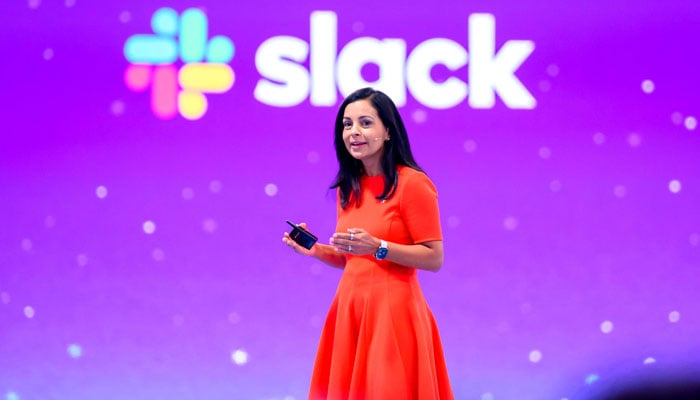Slack CEO insists platform 'equally' suited to excel in AI race due to quality of data
"We're quite different from teams... We're first and foremost a very open platform," says Slack CEO
Slack's CEO, who recently accepted one of the most prominent roles in Silicon Valley, has said that artificial intelligence (AI) is changing the widely used office chat network as part of an attempt to facilitate its users.
Lidiane Jones, a former Microsoft executive who was appointed as the new CEO of Slack in January, following the departure of co-founder and CEO Stewart Butterfield, has ensured the company doesn't fall behind its rival Microsoft
Jones, who rose to prominence at Salesforce, took over the company after the $27.7 billion acquisition and has made efforts for Slack's rapid growth, bringing stability to the platform.
"It's amazing what has happened to the world," Jones said of this AI moment that has captured the imagination of Silicon Valley and the world.
"We've launched more features in the last nine months than in the several years before," Brazilian-born and living in the Boston area, Jones said while speaking to an audience at San Francisco's "Dreamforce", Salesforce's big annual event to plug its new products.
Generative AI is believed to be revolutionising tools like Slack, which was initially designed for teamwork and communication. It now produces texts, images, and sounds on request in everyday language.
Additionally, Slack and Microsoft's Teams have released new versions with AI capabilities, resembling an online assistant.
"When I got back from my two-week vacation this summer, I had mountains of messages from customers and colleagues to catch up on," Jones said. "I asked 'Slack AI' to summarise everything and in two hours I was up to date, instead of spending a whole day, or even the week."
New AI tools are being used to automate complex administrative tasks like expense approval and connecting users to in-house expertise. Users can now speak to generative AI chatbots directly within Slack from providers like Anthropic's Claude and OpenAI's ChatGPT.
This availability of a wide range of third-party apps and tools "is our strength", said Jones.
"We're quite different from Teams... We're first and foremost a very open platform."
Microsoft previously has been criticised by Slack for bundling Teams, which has 300 million monthly users, with its largely popular Office Suite.
Despite Microsoft's compliance with Slack's demands, the EU investigation continues, and the company may face further regulatory fallout. However, Microsoft's significant investments in OpenAI have given it a competitive edge in generative AI, AFP reported.
Jones insisted that Slack is equally suited to excel in AI thanks to the quality of its data, the key ingredient in the technology's magic formula.
"We have all of a company's knowledge on the platform... staff are collaborating across different departments, all of that unstructured data is there," she said. "That makes our AI capabilities so powerful because it has so much context."
For the time being, Slack has no plans to develop its own language model, the systems at the heart of generative AI that have made OpenAI a household name.
"We don't feel we need to reinvent the wheel," Jones joked while reserving the possibility of one day designing a more specialised model.
On an even more distant horizon, Slack may one day develop highly personalised AI agents, sort of digital secretaries that know users down to their most personal details.
"It is definitely a plausible future. And, look, I have a family, I work, it's very busy... Isn't it amazing to think that a system can track all of it in one place? But it's gonna take time to make people comfortable to do that," she said.
"I think there's a possibility and desire, but the trust boundary is going take a while for us to get there."
-
‘Smiling electrons’ discovered in Earth’s magnetosphere in rare space breakthrough
-
Archaeologists unearthed possible fragments of Hannibal’s war elephant in Spain
-
NASA's Hubble Space Telescope discovers ‘Dracula Disk', 40 times bigger than solar system
-
Annular solar eclipse 2026: Where and how to watch ‘ring of fire’
-
Scientists discover rare form of 'magnets' that might surprise you
-
Humans may have 33 senses, not 5: New study challenges long-held science
-
Northern Lights: Calm conditions persist amid low space weather activity
-
SpaceX pivots from Mars plans to prioritize 2027 Moon landing












